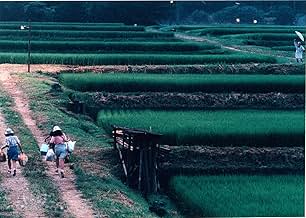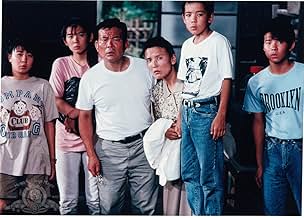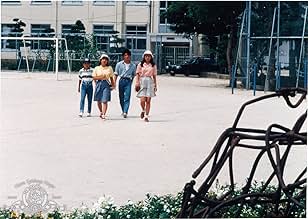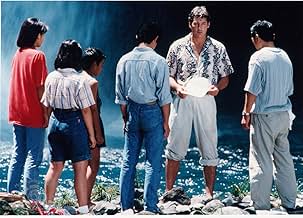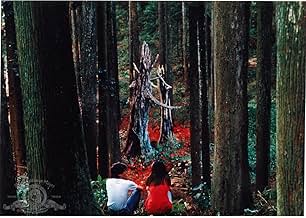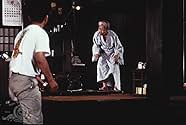IMDb-BEWERTUNG
7,2/10
8000
IHRE BEWERTUNG
Rhapsodie im August ist die eindrucksvolle Darstellung des nuklearen Holocausts in Nagasaki durch den japanischen Großmeister Akira Kurosawa, gesehen durch die Augen einer Überlebenden und i... Alles lesenRhapsodie im August ist die eindrucksvolle Darstellung des nuklearen Holocausts in Nagasaki durch den japanischen Großmeister Akira Kurosawa, gesehen durch die Augen einer Überlebenden und ihrer vier Enkelkinder - 44 Jahre später.Rhapsodie im August ist die eindrucksvolle Darstellung des nuklearen Holocausts in Nagasaki durch den japanischen Großmeister Akira Kurosawa, gesehen durch die Augen einer Überlebenden und ihrer vier Enkelkinder - 44 Jahre später.
- Regie
- Drehbuch
- Hauptbesetzung
- Auszeichnungen
- 5 Gewinne & 7 Nominierungen insgesamt
Richard Gere
- Clark
- (as Richâdo Gia)
Mieko Suzuki
- Minako
- (as Mie Suzuki)
Empfohlene Bewertungen
Although aware of Akira Kurosawa's standing in the realm of world cinema,I have never been a great fanatic of his films as most of them are Samurai films heavily laden with symbolic references to Japanese society.For me Akira Kurosawa's non Samurai films are better films as they speak of deeper issues like human sentiments.I watched "Rhapsody in August" directed by Akira Kurosawa film with rapt attention.As I was watching it after having watched "Madadayo",I could not help but comparing it both in style as well as content with that film.Both the films were made by Kurosawa when he was at the end of his career and may be for this reason he chose to make humanist stories.Rhapsody in August is a meaningful tale for all people whether they are young or old,American or Japanese.It is a film which shows how important a family is and how wisdom must be passed from the old to the young. Kurosawa has deftly tackled the question of Japan's Atomic bomb tragedy through plain words spoken by an old lady who tells her young grandchildren that with the passage of time all wounds are healed.Rhapsody in August tells us albeit in a non academic manner why it is important to live peacefully thereby avoiding war for the benefit of peaceful coexistence and human society.
A good movie is interesting and easy to understand. This is an absolute treasure of a film. A love letter to Nagasaki. An opportunity to see how deeply the atom bomb affected Japanese culture. An opportunity to see a number of the landmarks of the attack. And edited so wonderfully. Kurosawa always highly prized being able to tell the the story in images alone and understood how composition of shots increases content, and this movie has some very quiet sober shots that hit really really hard. It shows how we can fail to see things that are right under our noses for years and years. How things can happen that you never get over. I loved this movie!!!
A beautiful, beautiful film. If you only know Kurosawa through Seven Samurai then this will come as something of a shock. Gentle, sensitive, moving and uplifting. The cinematography is sumptuous with plenty of touches that let you know that this is no ordinary film maker. By far the best of his later films in my opinion.
Don't be confused by the 'starring Richard Gere' tag. He only has a minor part, though he takes it well.
Just go and see it!
Don't be confused by the 'starring Richard Gere' tag. He only has a minor part, though he takes it well.
Just go and see it!
"Rhapsody in August" (1991) is Akira Kurosawa's next to last film. It belongs to Kurosawa's final period of film-making when he moved away from themes such as samurai stories and historic eras of Japan and focused on issues such as the Second World War and its effect on the lives of ordinary people in Japan. The title of this film is a reference to August 9, 1945, when the atomic bomb fell on Nagasaki.
"Rhapsody in August" tells the story of four young girls and boys who visit their grandmother in a village near Nagasaki for their summer vacation. She is one of the survivors of the atomic bomb fell on Nagasaki during the war but she lost her husband in the atomic bomb attack. It is through her that her grandchildren learn about the atomic bomb attack and how it killed their grandfather. The children's parents have gone to Hawaii to visit the grandmother's elder brother, who had married an American woman and lived there since then.
The film shows how the children's indifference and disrespect for their grandmother gradually turns into understanding and respect for the sufferings she has gone through. We are allowed to explore the Nagasaki catastrophe through the grandmother's point of view and its aftermath through the children's view, who come to show much more understanding for the catastrophic event than their parents, who only seem to care about not raising the issue of the atomic bomb on fear that it might upset their American relatives and deprive them from their enterprise.
Although the film, in several occasions, makes direct criticism against the US over the Nagasaki atomic bomb attack, it is mostly through the grandmother's powerful and vivid recollections of the war, and the children's understanding of the events, that the depth of people's sufferings and the cruelty of the act -- the atomic bomb attack -- are seen. One great example is when the grandmother compares the mushroom cloud of the atomic bomb to a great eye watching over the city.
The grandmother is the living soul of all the pains caused by the atomic bomb and Kurosawa, all through the film and particularly in its iconic ending, well reminds us that time might not heal all wounds.
"Rhapsody in August" tells the story of four young girls and boys who visit their grandmother in a village near Nagasaki for their summer vacation. She is one of the survivors of the atomic bomb fell on Nagasaki during the war but she lost her husband in the atomic bomb attack. It is through her that her grandchildren learn about the atomic bomb attack and how it killed their grandfather. The children's parents have gone to Hawaii to visit the grandmother's elder brother, who had married an American woman and lived there since then.
The film shows how the children's indifference and disrespect for their grandmother gradually turns into understanding and respect for the sufferings she has gone through. We are allowed to explore the Nagasaki catastrophe through the grandmother's point of view and its aftermath through the children's view, who come to show much more understanding for the catastrophic event than their parents, who only seem to care about not raising the issue of the atomic bomb on fear that it might upset their American relatives and deprive them from their enterprise.
Although the film, in several occasions, makes direct criticism against the US over the Nagasaki atomic bomb attack, it is mostly through the grandmother's powerful and vivid recollections of the war, and the children's understanding of the events, that the depth of people's sufferings and the cruelty of the act -- the atomic bomb attack -- are seen. One great example is when the grandmother compares the mushroom cloud of the atomic bomb to a great eye watching over the city.
The grandmother is the living soul of all the pains caused by the atomic bomb and Kurosawa, all through the film and particularly in its iconic ending, well reminds us that time might not heal all wounds.
This film feels like a story the great Akira Kurosawa wanted to tell. Four grandchildren are staying with their aged grandma outside of Nagasaki. She is a survivor of the bomb in 1945, but her husband, a teacher, perished that day. The grandmother's children are in Hawaii visiting a relative and her husband, who is played by Richard Gere in a fine understated performance. Clark (Gere) and his wife have her father living with them, and they claim he is one of Grandma's brothers, but she cannot remember him. The film becomes a mediation on the war, specifically the devastating effect on Nagasaki. In one particularly touching scene everyone gathers at the school where Grandpa perished that day in August. There is a monument there built for the children who dies there that day, a sculpture of mangled monkey bars. The film is slow moving, meditative, but moving in its best moments. While not among Kurosawa's best work (its virtually impossible to stand up to such greatness), this last film of his is a touching tribute to a part of his life (and so many others) that is both easy to forget, but also impossible not to remember. The acting is uniformly very good, especially the four children and Grandma. Recommended.
Wusstest du schon
- WissenswertesAt the top of his career from starring alongside Julia Roberts in Pretty Woman (1990), Richard Gere was earning millions of dollars per picture. Akira Kurosawa's company felt they were unable to pay his salary, to which Gere responded with "I'll work free for Kurosawa." Not wanting to take advantage of the actor, they offered him a modest sum, as well as offering to pay for all his travel expenses, including friends he wanted to bring with him to Japan while he worked. One of those friends included Cindy Crawford.
- SoundtracksNobara (Heidenröslein)
Lyrics by Johann Wolfgang von Goethe (uncredited)
Music by Franz Schubert (as Shûberuto)
Performed by Hibari Jidou Gasshoudan (Hidetaka Yoshioka, Tomoko Ôtakara, Mieko Suzuki and Mitsunori Isaki)
Top-Auswahl
Melde dich zum Bewerten an und greife auf die Watchlist für personalisierte Empfehlungen zu.
- How long is Rhapsody in August?Powered by Alexa
Details
Box Office
- Bruttoertrag in den USA und Kanada
- 516.431 $
- Eröffnungswochenende in den USA und in Kanada
- 26.771 $
- 22. Dez. 1991
- Weltweiter Bruttoertrag
- 517.538 $
- Laufzeit
- 1 Std. 38 Min.(98 min)
- Farbe
- Seitenverhältnis
- 1.85 : 1
Zu dieser Seite beitragen
Bearbeitung vorschlagen oder fehlenden Inhalt hinzufügen


